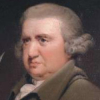Erasmus Darwin

Erasmus Darwin
Erasmus Darwinwas an English physician. One of the key thinkers of the Midlands Enlightenment, he was also a natural philosopher, physiologist, slave-trade abolitionist, inventor and poet. His poems included much natural history, including a statement of evolution and the relatedness of all forms of life. He was a member of the Darwin–Wedgwood family, which includes his grandsons Charles Darwin and Francis Galton. Darwin was a founding member of the Lunar Society of Birmingham, a discussion group of pioneering industrialists and...
ProfessionDoctor
Date of Birth12 December 1731
fool made experiments
A fool, Mr, Edgeworth, is one who has never made an experiment.
nature law house
Such is the condition of organic nature! whose first law might be expressed in the words 'Eat or be eaten!' and which would seem to be one great slaughter-house, one universal scene of rapacity and injustice!
retirement ends dangerous
[Retirement] is a dangerous experiment, and generally ends in either drunkenness or hypochrondriacism.
past ideas iron
We hence acquire this sublime and interesting idea; that all the calcareous mountains in the world, and all the strata of clay, coal, marl, sand, and iron, which are incumbent on them, are MONUMENTS OF THE PAST FELICITY OF ORGANIZED NATURE!
cat purring-cats cat-love
To respect the cat is the beginning of the aesthetic sense.
animal ideas parent
Some philosophers have been of opinion that our immortal part acquires during this life certain habits of action or of sentiment, which become forever indissoluble, continuing after death in a future state of existence ... I would apply this ingenious idea to the generation, or production of the embryon, or new animal, which partakes so much of the form and propensities of the parent.
hands parent evolution
The great CREATOR of all things has infinitely diversified the works of his hands, but has at the same time stamped a certain similitude on the features of nature, that demonstrates to us, that the whole is one family of one parent.
animal imperfection parent
Owing to the imperfection of language the offspring is termed a new animal, but it is in truth a branch or elongation of the parent; since a part of the embryon-animal is, or was, a part of the parent; and therefore in strict language it cannot be said to be entirely new at the time of its production; and therefore it may retain some of the habits of the parent-system. (1794)
parent quality wish
From the sexual, or amatorial, generation of plants new varieties, or improvements, are frequently obtained; as many of the young plants from seeds are dissimilar to the parent, and some of them superior to the parent in the qualities we wish to possess... Sexual reproduction is the chef d'oeuvre, the master-piece of nature.
nature flower animal
The colours of insects and many smaller animals contribute to conceal them from the larger ones which prey upon them. Caterpillars which feed on leaves are generally green; and earth-worms the colour of the earth which they inhabit; butter-flies, which frequent flowers, are coloured like them; small birds which frequent hedges have greenish backs like the leaves, and light-coloured bellies like the sky, and are hence less visible to the hawk who passes under them or over them.
flames wings shining
Till o'er the wreck, emerging from the storm, Immortal Nature lifts her changeful form: Mounts from her funeral pyre on wings of flame, And soars and shines, another and the same.
brother hero eye
So erst the Sage [Pythagoras] with scientific truth In Grecian temples taught the attentive youth; With ceaseless change how restless atoms pass From life to life, a transmigrating mass; How the same organs, which to-day compose The poisonous henbane, or the fragrant rose, May with to-morrow's sun new forms compile, Frown in the Hero, in the Beauty smile. Whence drew the enlighten'd Sage the moral plan, That man should ever be the friend of man; Should eye with tenderness all living forms, His brother-emmets, and his sister-worms.
animal years grandfather
In fact, Darwin's own grandfather anticipated the central tenet of Lamarckism by some seven years: "All animals undergo perpetual transformations; which are in part produced by their own exertions... and many of these acquired forms or propensities are transmitted to their posterity."
air wings car
Soon shall thy arm, unconquer'd steam! afar Drag the slow barge, or drive the rapid car; Or on wide-waving wings expanded bear The flying chariot through the field of air.